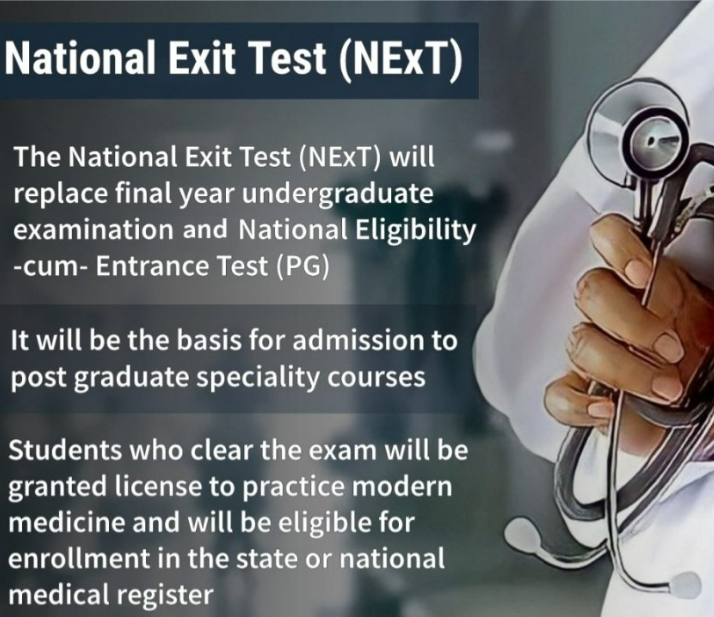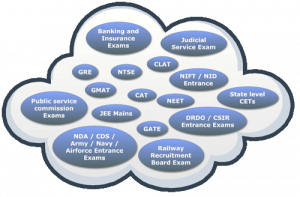Best Books to Read in 2023
Best Books to Read in 2023 Are you a bookworm or a bibliophile, if yes, then this is the ...
In 2024, the medical education landscape in India is set to undergo a significant transformation with the introduction of a groundbreaking new medical exam, the National Exit Test (NEXT). Designed to replace existing exams such as NEET PG and FMGE, the NEXT exam aims to revolutionize the assessment and licensure process for MBBS graduates in India.
This new examination has the potential to radically alter the future of medical practise in the country by elevating the standards of medical education and protecting patients. In this introductory piece, we’ll take a closer look at the impending NEXT test and the characteristics and consequences it has for medical training in India.
Also, read Best Alternative Courses for NEET UG Students with Low Scores

The National Exit Test (NEXT) for MBBS has had a dramatic impact on India’s medical education system. The government’s choice to schedule this test shows its dedication to strengthening medical training, protecting patients, and boosting the healthcare system as a whole. Some further specifics on the advantages and motivations for adopting the NEXT examination are provided below:
Ensuring Quality Medical Education: The NEXT exam aims to ensure that medical graduates possess the necessary knowledge and skills to practice medicine effectively and safely. By assessing the theoretical and clinical knowledge of graduates, the exam sets a higher standard for medical education, promoting excellence and competence among future medical practitioners.
Facilitating Mobility: Currently, medical graduates in India need to clear multiple exams, such as NEET PG and FMGE, to obtain licenses for practice. The introduction of the NEXT exam as a single gateway will make it easier for medical graduates to move between states and countries. This streamlined process will reduce the administrative burden and enable greater professional mobility.
Ensuring Qualified Practitioners: With its more rigorous nature, the NEXT exam aims to ensure that only the most qualified medical graduates are granted licenses to practice medicine. This will help maintain high standards of healthcare delivery and minimize the risk of incompetent practitioners. By assessing both theoretical knowledge and clinical skills, the NEXT exam aims to produce well-rounded professionals.

Transparency in the Licensing Process: The NEXT exam will introduce a more transparent licensing process. The results will be released in a timely manner, and the marking scheme will be made public. This transparency ensures fairness, reduces ambiguity, and builds trust among stakeholders, including aspiring medical practitioners, the medical community, and the general public.
Improved Patient Safety: By setting a higher standard for medical graduates, the NEXT exam ultimately enhances patient safety. It ensures that medical practitioners have a strong foundation of knowledge and clinical skills to provide competent and reliable healthcare services. The exam’s emphasis on competence and proficiency contributes to a safer and more reliable healthcare system in India.
The government of India’s decision to plan the NEXT exam reflects its commitment to improving medical education and healthcare standards in the country. The exam’s implementation is expected to bring numerous benefits, including quality assurance, professional mobility, transparency, and enhanced patient safety. As the NEXT exam progresses, it will be important to stay updated with official announcements and guidelines from the National Medical Commission (NMC) to understand the specific details and requirements of the exam.
Also, read NEET Cutoff Scores for MBBS Abroad in 2023
National Exit Test (NEXT)- Comprehensive Details
The National Exit Test (NEXT) is poised to revolutionize the medical education system in India, supplanting the NEET PG and FMGE exams. This comprehensive guide provides an in-depth overview of the NEXT exam, encompassing its structure, eligibility criteria, syllabus, marking scheme, and invaluable tips for effective preparation. With the NEXT exam serving as the gateway to obtaining a license to practice medicine in India, it is essential to equip aspiring medical professionals with the knowledge and resources necessary for success.
I. Exam Structure
Evaluating theoretical knowledge
Assessing clinical skills and knowledge
II. Eligibility Criteria
III.Comprehensive Syllabus for Success
IV.Marking Scheme and Qualifying Scores

V. Tips to Excel in the NEXT Exam
In conclusion, the implementation of the National Exit Test (NEXT) in 2024 represents a transformative step forward in the medical education system of India. By replacing the existing NEET PG and FMGE exams, the NEXT exam aims to raise the bar for medical graduates, ensuring that they possess the necessary knowledge and skills to provide competent and safe medical care. With its two-step structure, encompassing a computer-based MCQ exam and a clinical/practical examination, the NEXT exam offers a comprehensive evaluation that covers both theoretical understanding and practical application.
The NEXT exam sets a higher standard for medical education, emphasizing core medical subjects and fostering a well-rounded understanding of the various disciplines. It not only equips aspiring medical professionals with the knowledge required for medical practice but also evaluates their clinical skills and ability to apply that knowledge in real-life scenarios.
By streamlining the licensure process and establishing a uniform standard, the NEXT exam paves the way for enhanced patient safety, improved healthcare delivery, and increased professional mobility within India and abroad. As the NEXT exam prepares to revolutionize the medical education landscape in India, aspiring medical graduates must embrace this opportunity to excel.
By starting early, creating a well-structured study plan, focusing on core subjects, practising with MCQs, and taking mock exams, candidates can enhance their chances of success in this rigorous examination. The NEXT exam holds the promise of producing highly competent and qualified medical practitioners who are equipped to address the evolving healthcare needs of the nation, ultimately raising the standards of medical education and patient care in India
Also, read 5 Huge Mistakes that pull down your NEET Score
Meet Tanu Bhatnagar, an educational expert with extensive experience in teaching, research and mentoring.With a decade in... (Full bio)

Best Books to Read in 2023 Are you a bookworm or a bibliophile, if yes, then this is the ...

In the exhilarating journey of 10 Proven Memorize Techniques for Students learning, memory is your trusty companion. Whether ...

Top 20 toughest exams in world is about exams in the world that required very hard work to ...

Top 20 toughest exams in India - Exams are the perhaps most toughest moments for any student. A ...

Top 20 Colleges of DU Getting admissions to the top 20 colleges of DU is a dream for every ...

Top 20 NITs of India - Amongst the 31 NITs in India, today, we are talking ...

Here are the Top 12 Artificial Intelligence in Mumbai. Artificial intelligence (AI) refers to the simulation of human ...

As you stand on the Best Science Courses after 12th academic journey, the realm of science beckons, offering ...
Millions of students have entrusted CollegeChalo to facilitate their seamless and smooth admission process to their dream colleges and universities. With CollegeChalo, you can gain a competitive edge by easily accessing exam and course details to stay ahead of the admission journey. What are you waiting for?
Search your dream college